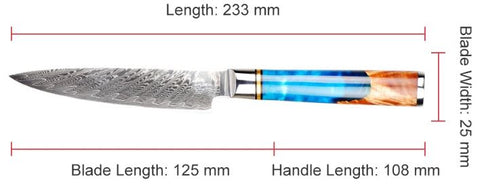- No products in the cart.
3 Piece Damascus Steel with Blue Resin Handle Kitchen Knife Set
$179.00 $269.00
In Stock
This beautiful set of Damascus Steel knives includes a Gyuto, a Santoku and a Petty / Utility knife. This is the perfect set whether you are an experienced cook or just starting...
Hurry, there are only 1 item(s) left!
Description
This beautiful set of Damascus Steel knives includes a Gyuto, a Santoku and a Petty / Utility knife. This is the perfect set whether you are an experienced cook or just starting out on your culinary journey.
The set includes:
- 8" Gyuto / Chef Knife
- 7" Santoku
- 5" Petty / Utility Knife
Blade Material:
Made from 67-layer Damascus Steel comprising of a VG10 Steel core and 33-layers of Stainless Steel on each side.
Handle Material:
Made from Blue resin and coloured natural wood. Stainless steel end cap. As the handle is made from a combination of resin and natural wood, each handle is unique.
Please note that every knife handle is different. Some will have more resin and less natural wood while others will have less resin and more natural wood. If you have a preference of more or less resin in your handle, please include a message with your purchase and we will do our best to find a handle to match your request.
Packaging:
Each knife comes in a separate black gift box
Origin:
Made in China.
GYUTO
About Gyuto Knives
The Gyuto (牛刀) in all-rounder and is the Japanese equivalent of the classic French chef’s knife. It can be used for meat, vegetables and fish. The name Gyuto literally means “beef-sword”, as it was originally designed for cutting chunks of meat. When preparing vegetables, it is used by chopping or thrust-cutting near the heel of the knife. It is also used to rock-chop stiffer produce and to make fine cuts at the tip of the knife. It is used for many different cuts of meat. For larger cuts it is used to saw back and forth, to pull-cut softer meats, and push-cut more muscular cuts of meat. The pointed tip makes it useful for detailed work.
Specifications:

| Thickness | 2.2 mm |
| Blade length | 20.5 cm |
| Total length | 34.0 cm |
| Blade Height | 4.7 cm |
| Weight | 215 g |
| Hardness | 60 ±2HRC |
SANTOKU
About Santoku Knives
Santoku (三德) translates as "three virtues". The name relates to the versatility of this blade shape, for instance for vegetables, meat or fish. It is the best-selling shape of blade in Japan. The design is a mix between a Gyuto and Nakiri.
Traditionally, it has a very flat blade profile, although recently companies have begun making more curved blades to cater to western habits. Since they are flatter, the wrist is in a more natural position and the shoulder does not need to be raised as high when using this knife, so you do not require as much room to cut.
Specifications:

| Thickness | 2.2 mm |
| Blade length | 18.5 cm |
| Total length | 30.9 cm |
| Blade Height | 4.4 cm |
| Weight | 250 g |
| Hardness | 60 ±2HRC |
PETTY
About Petty Knives
Petty knives are a small general-purpose knife that is used for peeling, shaping and slicing fruit and vegetables. It is also used for chopping hers and making garnishes. The knife is very nimble and easy to control because of its small size and narrow blade. It is therefore the ideal knife for making precise cuts.
Specifications:

| Thickness | 1.84 mm |
| Blade length | 12.5 cm |
| Total length | 23.3 cm |
| Blade Height | 2.5 cm |
| Weight | 84.5 g |
| Hardness | 60 ±2HRC |
Shipping
This items includes free shipping within Australia. Upgrade to Express Post for $6.95.
Shipping to New Zealand is calculated at checkout.
Care Instructions
CARE AND USE INSTRUCTIONS
- Suitable for use on fish, meats and vegetables.
- Do not use on frozen foods or bones. The blade could chip or break.
- Only use natural wood or plastic cutting boards. Never use stone, glass or other rigid cutting surfaces.
- Hand wash with warm soapy water, rinse clean and dry after each use.
- Avoid prolonged immersion in liquids (water, solvents, etc).
- Do not clean in the dishwasher. Sharpen using a whetstone or a quality knife sharpener.
- Store your knife in a dry place.
- Given the right conditions, any steel can rust. If you are in a humid climate or coastal region it is important to keep your knife's blade protected with a quality knife oil.
- As a minimum, wipe the blade with oil, 3 to 4 times a year to stop rust forming (more often if near water). We recommend Tsubaki oil (Japanese Camellia Oil) which has been used for centuries by Japanese knife makers to protect all types of steel.
























